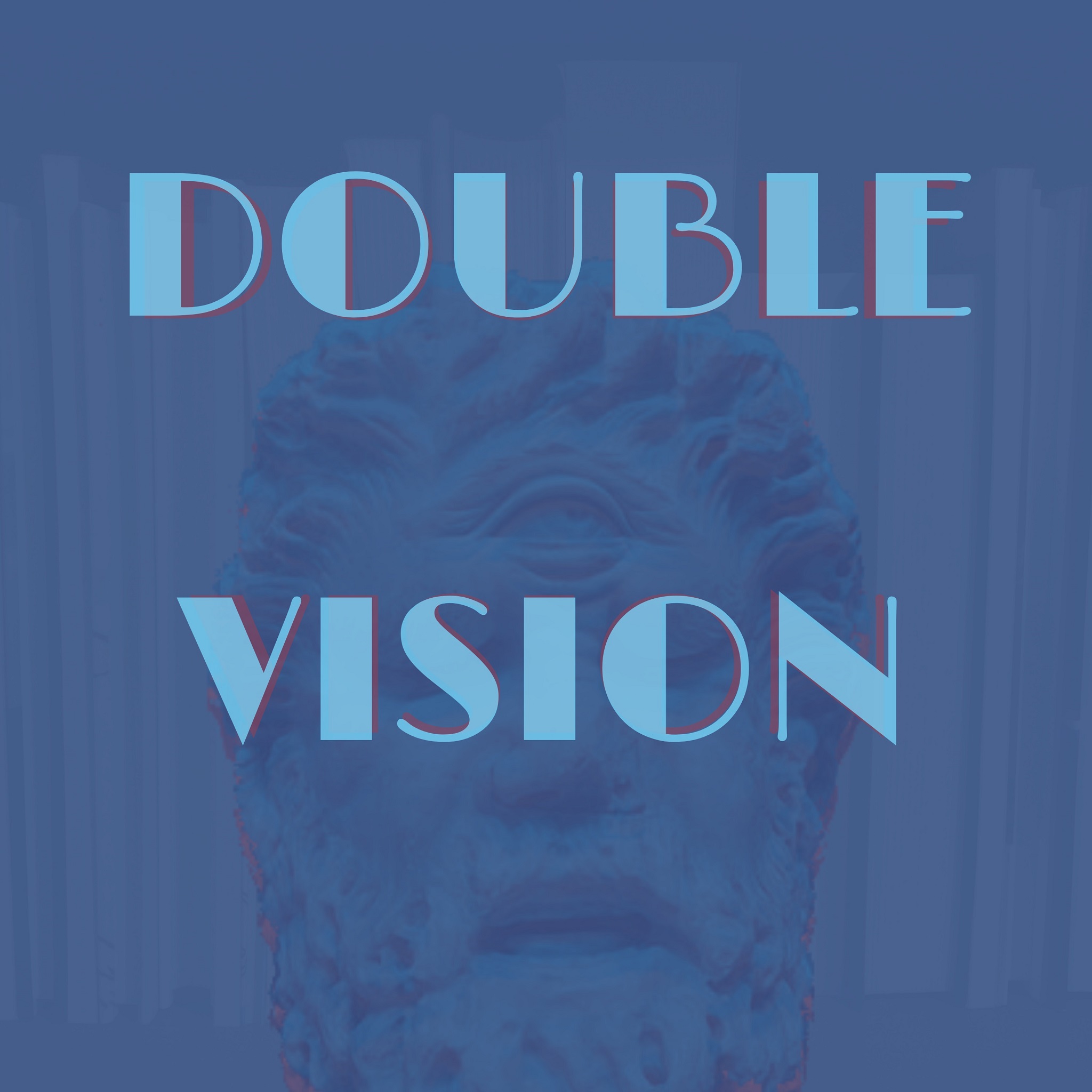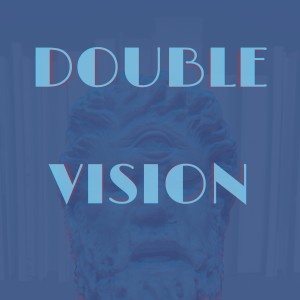
2.1K
Downloads
17
Episodes
Double Vision explores moments of synchronicity between closely released literature and film pairings. Hosted by Timothy Wilcox, Ph.D., and featuring frequent guests, each week we will explore two visions – one from each genre – and discuss moments of multiple discovery and creative distinction. Intro and outro music by York Morgan (https://yorkmorgan.bandcamp.com).
Episodes

Friday Apr 02, 2021
Simulated State-Created Podcast Event ft. Noah (@trycypress)
Friday Apr 02, 2021
Friday Apr 02, 2021
Released less than one month apart at the start of 1985 are two satires of contemporary bureaucratic and consumer life, one an American novel and the other a British film. Don DeLillo's White Noise and Terry Gilliam's Brazil each stand up as profound visions of their late 20th century moment. With my guest Noah (@trycypress), we bring these two together to question what is really going on and what hope do we have to break through the white noise and the threat of state-created terminology.

Thursday Mar 18, 2021
Tradhumanism Ex Machina ft. Adam Jesionowski
Thursday Mar 18, 2021
Thursday Mar 18, 2021
In 2014, Alex Garland's film Ex Machina imagines a contest between two humans, structured narratively around an artificially intelligent humanoid robot. At the same time, Roger Scruton explores the concept of the sacred in The Soul of the World, addressing the ways in which we address ourselves to the face of the other and the face of the world, finding the presence of God and the presence of the soul through transcendent experience. With guest Adam Jesionowski (Counterengineer), we explore the film's attempts to locate the God from the machine, and Adam presents a tradhumanist alternative to the film's more popular transhumanist perspective.

Thursday Mar 11, 2021
Yvor Winters' Easy Ride ft. E. L. Brooks
Thursday Mar 11, 2021
Thursday Mar 11, 2021
The 1969 film Easy Rider and the late poetry of Yvor Winters offer a striking double vision of California and its place in both the American landscape and culture. The film stars Peter Fonda and Dennis Hopper as two motorcyclists struggling to take it easy in a hostile America, traveling east from California. Earlier, Winters traveled west to California, finding it conducive to his poetic imagination. Writer E. L. Brooks (PoetRegressive) joins me to discuss Winters' poetic theories and the dangers of unbound passion presented in Easy Rider.

Thursday Mar 04, 2021
Dead Dreams at the Turn of the Century ft. nameandnoun
Thursday Mar 04, 2021
Thursday Mar 04, 2021
Joined by guest poet Steff (@nameandnoun), we go back in time to explore intimacy, womanhood, family, and more in the year 2000. As seen prominently in Darren Aronofsky's film Requiem for a Dream, despair, addiction, and desperation tears through multiple lives. Meanwhile, Kim Addonizio explores these issues in her own way in her poetry collection Tell Me. Bringing these two visions together, we see a moment of deep social anxiety at the turn of the century.

Friday Feb 26, 2021
Our Cyberpunk Before ft. James McGirk
Friday Feb 26, 2021
Friday Feb 26, 2021
In 1966, we find two distinct visions which become foundational for cyberpunk a decade and a half later. In Robert Stone's novel A Hall of Mirrors, a man gets taken on as a radio host, forming conspiratorial patterns in the news to guide public opinion. Then as predecessor to the sort of console cowboys who would later roam cyberspace, The Good, the Bad, and the Ugly shows us a different set of opportunists. Are these figures immoral or amoral? What models are we offered here for imagining information exchanges? With my guest, James McGirk of Our Cyberpunk Now, we explore what we inherit from this double vision.

Friday Feb 12, 2021
Taking Off Atomised Society's Glasses ft. Default Friend
Friday Feb 12, 2021
Friday Feb 12, 2021
Two influential, distinct visions of romance and our social structures at the end of the 20th century, Michel Houellebecq’s Les Particules élémentaires and the romantic comedy She’s All That come out half a year and an ocean apart. In one, two isolated half-brothers struggle to find love and physical affection, while in the teen movie, the social outcast Laney Boggs is brought out to become one of the most attractive and popular girls at her school. With my guest, Default Friend, we explore the ways in which these two works each give a serious vision of some part of this late 20th century moment.

Thursday Feb 04, 2021
Coming of Age in 1995 ft. goblinodds
Thursday Feb 04, 2021
Thursday Feb 04, 2021
Two striking visions of coming of age – Ursula K. Le Guin's story "Coming of Age in Karhide" and Amy Heckerling's film Clueless – come out two months apart in mid-1995. The former depicts a planet of androgynous beings whose gender and sexuality continually adapt to others within a state known as "kemmer." The latter adapts Jane Austen's 1815 novel Emma as about a high school student living in Beverly Hills, playing her hand at matchmaker until she falls in love herself. My guest, @goblinodds (Twitter / YouTube), joins me to explore how these two works cohere into one profound double vision.

Thursday Jan 28, 2021
Observations Above and Within the Sea
Thursday Jan 28, 2021
Thursday Jan 28, 2021
Marianne Moore releases her poetry collection Observations in December of 1924. Prominent throughout the collection are images of the sea in particular. The sea frames Moore's poetic and philosophic project, but looking at the timing of this publication, she is not alone in this interest. The most popular film of the year is The Sea Hawk, an adventure story in which a man is enslaved at sea and goes on to become a pirate king and win back the life stolen from him. These two visions are very different on the surface, but seen as a double vision, we understand how they both understand the same long history at this same moment in time.

Thursday Jan 21, 2021
Countercultural Inheritance ft. Geoff Shullenberger
Thursday Jan 21, 2021
Thursday Jan 21, 2021
In February 1990, Thomas Pynchon releases Vineland, his first novel since the momentous Gravity's Rainbow 17 years prior. The novel focuses on the teenage daughter of a 1960s counterculture radical, trying to come to understand her parents' past and the world she has inherited amid the relentless pursuit of an FBI agent. Simultaneous with this release, set just down the road, is the film Flashback, in which a legendary hippie has been caught after going underground for twenty years, and the young FBI agent tasked with transporting the man instead has to grapple with the reality of his parents' culture. My guest, Geoff Shullenberger, lecturer at New York University and writer of his online project Outsider Theory, sees these two as not just a look at the past, but prescient visions of our present moment as well.

Friday Jan 15, 2021
Reflections Unprying
Friday Jan 15, 2021
Friday Jan 15, 2021
In 1972, John Berryman dies and David Lynch begins work on his first feature-length film, Eraserhead. It takes Lynch five years to complete the film, the same span of time needed for John Haffenden to find, transcribe, organize, and publish a selection of leftover Berryman poems, which he prints as Henry's Fate, in reference to central character Henry of Berryman's Dream Songs. Here we see Henry in new dream songs, released March 1977, the same month as Lynch tells the story of his Henry. We live inside of a dream, and some people want to pry it all open. What else can art do at this moment than subject Henry to such a fate? We get at this moment a double vision of just this possibility.
